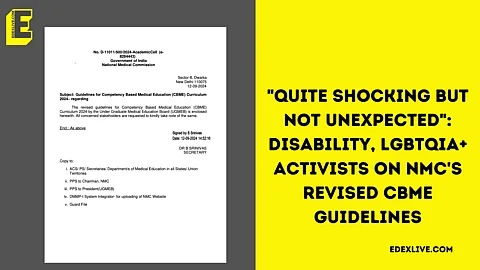"Quite shocking but not unexpected": Disability, LGBTQIA+ activists on NMC's revised CBME guidelines
The Competency-Based Medical Education (CBME) programme, created to enhance medical education through disability guidelines, was first introduced in 2019. These guidelines, pertaining to the Bachelor of Medicine, Bachelor of Surgery (MBBS) curriculum, were revised on August 31 of this year.
The reintroduction of these guidelines by the National Medical Commission (NMC) last month sparked controversies among undergraduate (UG) and postgraduate (PG) medical students.
Doctors with disabilities have voiced significant concerns about the reintroduced guidelines, and a revised version of the circular, for the third time, was released yesterday, September 12. However, this third revision has also faced criticism from a segment of the medical community.
Dr Satendra Singh, the founder of Doctors with Disabilities: Agents of Change and Director-Professor of Physiology at UCMS & GTB Hospital, Delhi, wrote the letter to the Union Minister of Ministry of Social Justice and Empowerment (MSJE), who is also Chairperson of the Central Advisory Board on Disability under the Rights of Persons with Disabilities Act (RPDA) 2016 and the National Council for Transgender Persons under the Transgender Persons (Protection of Rights) Act (TPA) 2019, expressing his dissatisfaction with the new guidelines.
He mentioned that after writing to the Health Minister and receiving no response, he has now issued a letter to the Minister of Social Justice.
The letter, which EdexLive accessed, highlighted the elimination of important points in the 466-word document. A few lines of the letter read, "In the 466-word document, there is no mention of key terms such as “dignity” or “transgender.”
During the two-week foundation course, while 8 hours of protected time is dedicated to “sports,” there is no explicit mention of disability competencies which were mandatory in the 2019 curriculum (7hours), but are now removed."
Dr Singh alleged that the NMC is known for its unreliability and being unconcerned regarding guidelines related to differently-abled doctors and doctors from the Lesbian, Gay, Bisexual, Transgender, Queer, Intersex, and Asexual (LGBTQIA+) community.
"Several times NMC has taken a U-turn in the past. It was quite shocking but also not unexpected from NMC. Nobody can trust or rely on them," he said. He further expressed confusion over the removal of what was previously considered best practice and mandated by laws. "I am still confused as to why they ignore issues concerning disabilities," he added.
Furthermore, Dr Singh also highlighted the recent issue where National Eligibility cum Entrance Test (NEET) candidates with disabilities are being rejected on grounds of competency. "This is where change is required. A model which is inclusive of differently-abled doctors should be introduced by authorities and adopted by people," he explained.
EdexLive also spoke with Dr Nonita Gangwani, an MBBS graduate and assistant professor at the University College of Medical Sciences, Delhi. Dr Gangwani, who also has a disability, commented on the revised circular. She observed that the changes were not noteworthy and that the only change was the removal of lesbianism as a sexual offence.
Besides this, nothing else was significantly revised. She also pointed out the absence of references to the Rights of Persons with Disabilities (RPWD) Act, 2016.
"Again the same question remains. Communication! How does one communicate when a person with a disability comes in," questioned Dr Gangwani. She raised concerns about communication with persons with disabilities in outpatient settings.
"We are expected to communicate with them in a way that they would understand," she explained. She emphasised the importance of dignity and inclusivity for specially-abled and LGBTQIA+ community doctors. "Forthcoming doctors must be more inclusive," she concluded.


